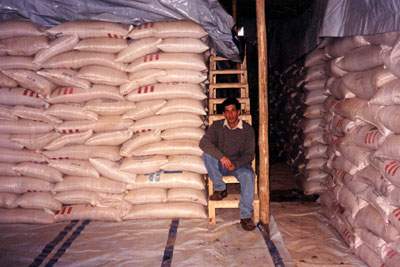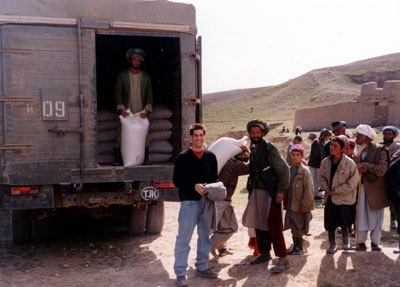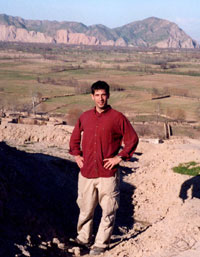International Concern: Benjamin Sand '94
“You’re in these far-off countries witnessing unbelievable untold horrors and nobody knows about it,” said Benjamin Sand ’94, conveying his frustration about the work that he is most passionate about. But Sand, currently a senior program officer at the international aid organization Concern Worldwide and a journalism student at USC’s Annenberg School for Communication, intends to tell all.

Sand sitting in a Concern Worldwide warehouse full of flour ready to be distributed to families in Northern Afghanistan
When he joined Concern Worldwide two years ago, Sand was responsible for managing U.S.-funded programs in Africa, Asia, and Latin America. (The organization was founded in 1968 in Ireland in response to the Nigeria-Biafra conflict, considered by many to be one of Africa’s first and most bloody civil wars. Today, Concern Worldwide implements emergency relief and long-term development programs.) Among other places, Sand’s work has taken him to East Timor, Eritrea, and southern Sudan.
In February 2002, Sand traveled to northeast Afghanistan, to an area he described as an active hot zone. “It was the most striking environment I’ve ever worked in,” he recalled. “The people themselves were incredibly resolute with their own development.” There he oversaw $4–5 million in programs for Concern Worldwide, and “responded to refugees, oversaw food distribution, and helped people rebuild homes, process events, and rebuild their lives.”
Before getting out in the field, Sand liaised with the U.S. government, from which he succeeded in soliciting $3 million for the organization’s programs in Afghanistan. While a full-time student at USC, Sand continues to concentrate on fundraising for Concern Worldwide through private foundations.
Sand said that this recent path — international aid work and public service in general — came as a surprise to him. An urban studies major, he traces his current professional pursuits back to his days at Vassar, and to Betsy Kopstein in the Office of Field Work. “At Vassar,” Sand said, “I figured out what I was good at and what I could do.” He worked with young people at the Poughkeepsie Children’s Home and the middle school, and later started a program on campus with Isaac Solotaroff ’93 to pair kids from Poughkeepsie with “big brothers” and “big sisters” on campus. “The Office of Field Work really encouraged me to apply lessons I’d learned in classrooms to the community,” he remarked.
After graduating, Sand took a job as a teacher and curriculum consultant at Prep for Prep in New York City, where he had worked during summers while in college. At another teacher’s urging, he joined the Peace Corps and was stationed in El Salvador for two years. “I loved the challenge of living in a new environment and working with people on a grassroots level,” he recalled. Seeing changes occur in communities on a daily basis was inspiring, he added.

Emergency food distribution in Afghanistan
When Sand returned to the United States, he continued working in community service — at the Clinton Housing Development Company in New York City, which works to develop affordable housing in the Hell’s Kitchen neighborhood. Before long he reoriented himself toward international aid, working as a desk officer for International Medical Corps in Los Angeles.
On September 11, 2001, Sand was working for Concern Worldwide in New York City. Reflecting on how the events of that day changed the role of aid organizations, Sand said, “It’s certainly more important now. I think 9/11 reminded us of why [aid work] was always so important. It forced us to look in dark corners of the world. It showed us what happens if we’re not there.”

In the hills of Northern Afghanistan
Sand said he meets a lot of people who assume dissonance on his part because of his involvement with international aid organizations. He prefers to strike a balance. “The United States is one of the greatest countries in the world,” he believes. “A lot of my work is trying to separate the rhetoric from the reality. A lot of people say what we do is always right. I’m much more comfortable saying we’re not always right — but when we are, we do things incredibly well.”
Ultimately, Sand’s experiences in the field led to his desire to become a journalist. This summer he will be working in Hong Kong for Voice of America, an international broadcast service funded by the U.S. government. “In America,” he observed, “people aren’t being shown the important stories. I hope to parlay what I’ve been doing into a more public expression.”
Photo credit: Courtesy of Benjamin Sand ’94
